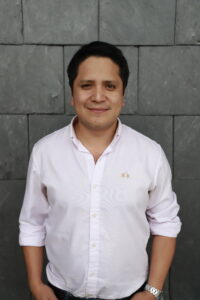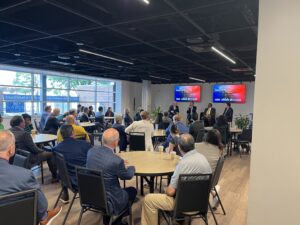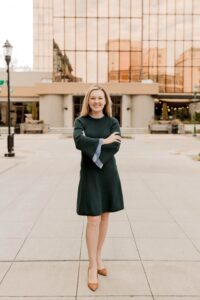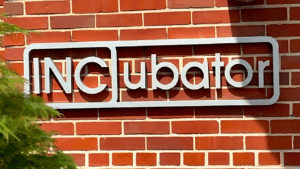Madison McCann
Circadian Consulting, LLC provides environmental consulting services to the commercial development community. They manage the environmental aspects of any project, from impact planning, field services and analysis to permit compliance and reporting to mitigation services. Circadian has been a client of the Tennessee Small Business Development Center since early 2017, and is currently a client in the INCubator at the Hamilton County Business Development Center.
I met with Clea Klagstad, Circadian’s Founder and CEO, to discuss her roots, how she conquers failure and her outlook on the long term health of the environment.
The Backstory
Klagstad became inspired to study environmental science after taking a course in Biology at Middle Tennessee State University (MTSU) with Michael Rutledge, Ph.D.
“It was a thought-provoking class. Dr. Rutledge talked about the problems we face in our communities – leaky pipes, contaminated water, deforestation – all the threats to biodiversity. There are countless environmental issues to consider as we grow, and we need more people to help balance those things.”
She also earned a Master’s Degree under Dwayne Estes, Ph.D., at Austin Peay State University (APSU).
“Dr. Estes is one of the best botanists in the Southeast and instilled a strong sense of environmental responsibility in his students.”
Upon graduation, Klagstad began working in the conservation sector before moving into the environment consulting industry. After nine years in the environmental field, she decided it was time to launch Circadian.
Her primary motivation? Since the beginning of her career, Klagstad has completed challenging work. From eight-day wilderness backpacking trips, to resurrecting an oil and gas department, to starting a new branch of a large company, none of the positions she filled were easy.
“Through those assignments, I learned that the success of a project most strongly correlates with the abilities of the project manager. I remember working with great environmental consultants and those who made me question my career choices. Ultimately, I have strong passion for this work, and thought I could positively impact the development industry by starting a company whose mission was to assist those companies in protecting the environment. We know how to get the project done quickly and correctly the first time.”
Maintaining a Positive Outlook
McCann: Chattanooga is in a development boom. This is great for the city, but it also means that we're impacting our environment. How do we stay positive about that?
Klagstad: It’s a tough balance. Chattanooga is surrounded by some of the most biodiverse ecosystems in the nation. And if you have ever driven by a subdivision or road under construction, the consequences of development are very clear. But you have to ask where the demand is coming from – what is driving the construction? While there are a few people I know who live completely off the grid, the rest of us require housing connected to sewer lines, electricity and gas. Most of us drive a car to work and rely on plastics for a considerable amount of the activities in our day-to-day lives. In order to continue living this way, development is fundamental to our communities.
I think what keeps my outlook positive is the idea that Chattanooga is beginning to think seriously about sustainable development. The city is a place where green businesses are thriving, including green|spaces, Green Steps and WaterWays. Our clients are beginning to understand the importance of accurate wetland and stream assessments, state- and federally-listed plant surveys and relocations and sound stormwater design and implementation. We are beginning to see our communities ask for greener development strategies, and our developers are listening.
McCann: Are you optimistic about Chattanooga’s future with regard to development?
Klagstad: Very! We are working with a few very focused developers who are really raising the bar. As a whole, our city still has a ways to go, but I feel optimistic about the growth of Chattanooga. If we want to lead in sustainable development, it would be relatively easy to get there from where we are today.
Advice for Aspiring Entrepreneurs
McCann: What advice do you have for other entrepreneurs?
Klagstad: As a young woman in the construction industry, I found it difficult to assure potential clients that we have something really incredible to share with the community. That was a big challenge when I first started Circadian. You just have to keep trying and remember why you started.
You need to be strategic with your time, too. My views of networking have changed a lot over the past two years. When I first started this business, I wanted to understand how the city worked, so I got involved with a lot of organizations in the community. Over the past two years, I joined the Chattanooga Chamber of Commerce and got involved with a number of environmental nonprofit organizations including WaterWays, Southeastern Grasslands Initiative and the Clean Earth Collective. I have been a guest speaker at the University of Tennessee at Chattanooga, Notre Dame High School and Howard High School. I also graduated from the Protégé Class of 2019, a program of the Young Professionals of Chattanooga.
I learned so much from these experiences, but I’ve had to step back and really understand where my clients live and work. This year I am refocusing on getting our brand out there to the people who need us the most.
Upcoming Projects
McCann: What’s up with Circadian this year?
Klagstad: 2019 is all about growth. We’re looking for a few part-time employees and interns to assist with fieldwork. We are working with amazing clients within the private and nonprofit development sector and are also trying to break into state and federal contracting.
We are also looking at a few events. Last year I hosted the Environmental Permitting Symposium. We invited regulators from the state to meet and discuss updates and changes to regulatory processes. This year, we will be hosting the event as part of the Chattanooga Development Symposium, managed by Maria Price with the City of Chattanooga. The event will be held Aug. 6 at Chattanooga State Community College. It is open to all, and we are targeting architects, developers, engineers and environmental consultants who can earn continuing education credits for attending. Students are welcome too.
McCann: How has the TSBDC helped your business?
Klagstad: I would not be here if not for the counselors at the Tennessee Small Business Development Center. The TSBDC helped me understand that the hurdles small businesses experience are a normal part of the process. And it is a roller coaster. You’re going to be stressed out and struggle through days that don’t work. You have to keep going, and maintain the strategy you created from the day you wrote that business plan.
Find out more about Circadian Consulting here.
Find out more about TSBDC Chattanooga here.







